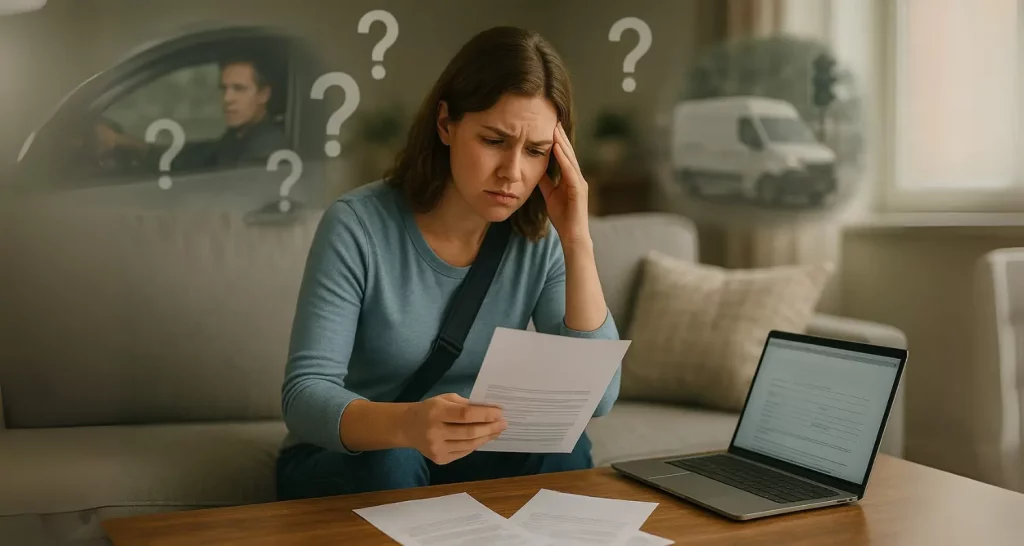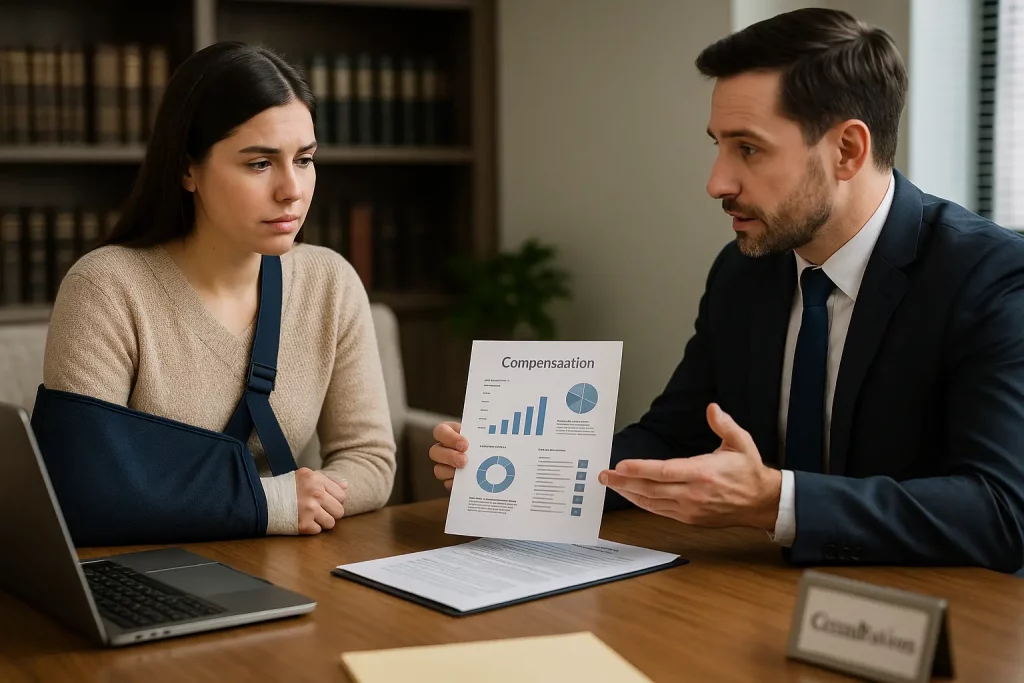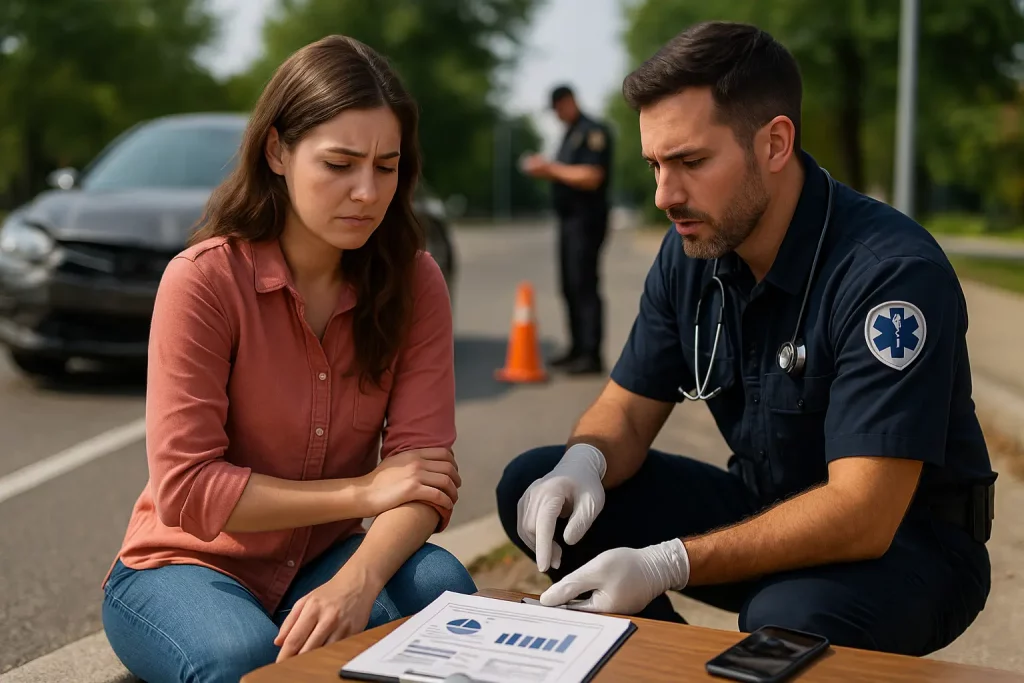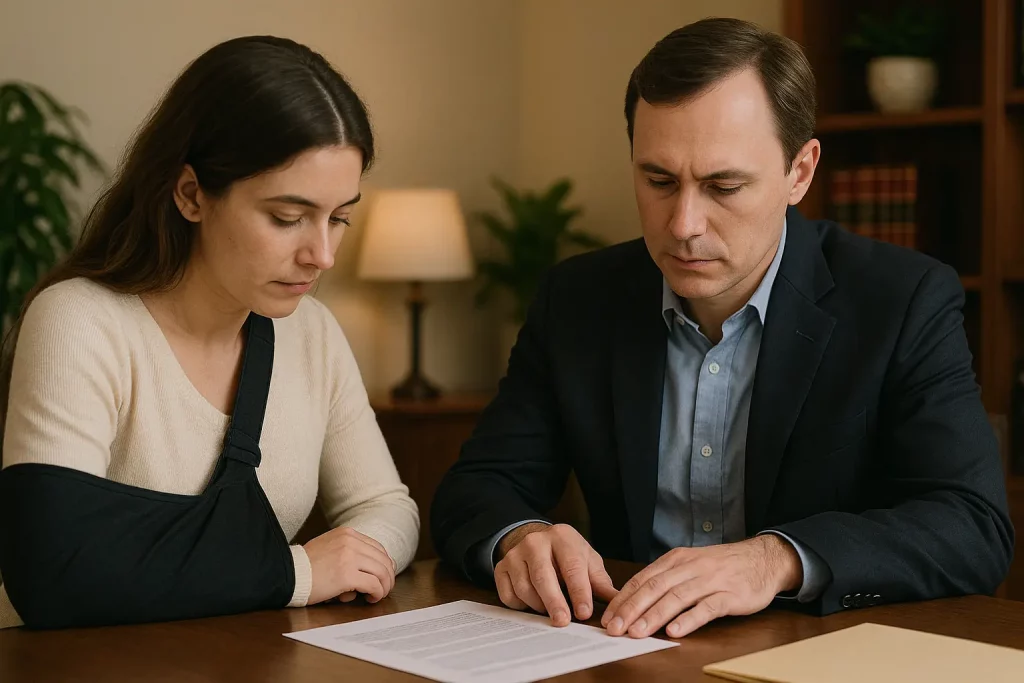If you were riding as a passenger in a car accident in Illinois, you’re not alone. In 2023, more than 87,000 people were injured in motor vehicle crashes across the state, and passengers often bear the brunt of the injuries without any clear understanding of their legal options. You might be wondering what comes next. Can you sue? Who is responsible? And how much compensation can you expect?
Under Illinois law, passengers typically have strong rights when it comes to recovering money for their injuries. You may be able to bring a passenger injury claim against one or more drivers, regardless of who was ultimately at fault. But the process can get complicated – especially in crashes involving family members, uninsured drivers, or rideshare services.
In this article, we’ll explain your legal rights as a passenger, including who you can sue and what kinds of compensation are available. We’ll also address one of the most common questions people ask: how much money can a passenger in a car accident get?
Let’s start by looking at what Illinois law says about passenger rights after a crash.
Key Takeaways
- You may have multiple legal options – Injured passengers in Illinois can often sue one or both drivers, and sometimes third parties like rideshare companies, employers, or even vehicle manufacturers.
- Compensation depends on both your injuries and available insurance – Settlement value is influenced heavily by the severity of your injuries and the policy limits of everyone involved.
- Delays in medical treatment can seriously hurt your case – Gaps in care are one of the most common reasons insurers deny or minimize passenger injury claims.
- Hiring a lawyer early gives you the best chance at full compensation – From protecting your rights with insurers to identifying all available insurance, early legal representation is one of the most important steps you can take.
Legal Rights of a Passenger in a Car Accident
Illinois uses a fault-based insurance system, which means the person who caused the accident is financially responsible for any resulting harm. This system benefits passengers, because they are rarely – if ever – assigned blame for a crash. As a result, injured passengers are typically entitled to full compensation from one or more at-fault parties.
When a passenger is injured, they can file a personal injury claim against:
- The driver of the car they were riding in, if that driver was negligent;
- The driver of another vehicle involved in the crash, if that person was at fault;
- Or both drivers, if each shares some responsibility for the accident.
This framework allows passengers to seek recovery even in complex situations. For example, if you were in a rideshare vehicle and another driver ran a red light, you might have claims against both the rideshare driver (if they were speeding) and the driver who caused the collision. You don’t have to choose just one.
It’s also important to understand that passengers are not limited to suing individuals. You may have a claim against a company, such as a rideshare service, delivery company, or municipality, depending on who owned or operated the vehicle.
Next, we’ll look more closely at how liability works and which parties you may be able to sue after an accident.

Who Can a Passenger Sue After a Car Accident?
When you’re injured as a passenger, one of the first legal questions is, “I was a passenger in a car accident, who do I sue?” The answer depends on who caused the crash—but it’s not always limited to the drivers involved.
The Driver of the Vehicle You Were In
If the driver of the car you were riding in caused the accident, you may have a valid legal claim against them. This includes situations where the driver was speeding, texting, or ran a stop sign.
Although this may feel uncomfortable, remember that the driver’s insurance company – not the driver personally – typically pays for your injuries. An exception may apply if you live with the driver and are related, in which case a “household exclusion” might limit your claim.
Example
You’re riding with a friend who runs a red light and causes a T-bone collision. You suffer a fractured wrist and a concussion. You can file a lawsuit against your friend to recover compensation for your medical bills and lost wages – even though they didn’t intend to hurt you.
The Driver of Another Vehicle
If another driver caused the crash, you can sue that person directly. This is often the case in rear-end collisions, left-turn accidents, or highway crashes where another driver was speeding or distracted.
If multiple drivers share blame – such as in a multi-vehicle pileup – you may be able to sue both and let the court assign fault percentages.
Example
You’re a passenger in your coworker’s car when they get rear-ended on I-290 by a texting driver. You end up with neck and back injuries. In this case, you would likely sue the driver of the other car for negligence.
A Third Party
In some cases, drivers aren’t the only ones at fault. You may also have a claim against a third party if they contributed to the crash.
Vehicle manufacturer: A defective airbag fails to deploy in a crash, making your injuries worse. You might sue the carmaker under a product liability theory.
Government agency: A missing stop sign at an intersection leads to a collision. You could bring a claim against the city or county for negligent road maintenance.
Commercial employer: A delivery truck driver runs a red light while rushing between jobs. If you’re in the other vehicle, you may have claims against both the driver and their employer.
Auto repair shop: Your rideshare vehicle had brakes replaced the day before the crash, but the mechanic failed to tighten a key bolt. The brakes give out on Lake Shore Drive. In this case, you could sue the repair shop for negligence.
When Passengers May Share Fault
Although passengers are usually not blamed for car accidents, there are situations where their own actions can reduce or even bar recovery. Illinois uses a modified comparative fault system, which means that if a passenger is found to be more than 50 percent responsible for their own injuries, they may be unable to recover any damages.
Common Scenarios
Riding with a known drunk driver: You leave a bar and accept a ride from a friend you saw drinking heavily. If the friend crashes and you’re seriously injured, a court may find that you knowingly took on the risk – especially if there were safer options like rideshare available.
Distracting the driver: You grab the steering wheel as a prank or try to show the driver something on your phone, causing them to lose focus and crash. Even if the driver made a mistake, your interference could reduce your share of recovery.
Not wearing a seatbelt: Suppose you weren’t buckled in and suffered more severe injuries in a rollover. The court might reduce your compensation if it finds that wearing a seatbelt would have prevented or lessened your injuries.
Each of these examples is fact-specific. Courts will consider what a reasonable person would have done under the same circumstances, and whether the passenger’s choices contributed to the outcome.

How Much Money Can a Passenger Get in a Car Accident Claim?
One of the most common questions passengers ask after a crash is, “How much money can a passenger in a car accident get?” It’s a fair question – and one of the hardest for any lawyer to answer. There’s no simple formula, and in Illinois, outcomes vary widely depending on the severity of your injuries, the parties involved, and the amount of insurance available to pay your claim.
What Compensation Covers
If you were injured as a passenger in a car accident, Illinois law allows you to seek compensation for a range of damages, including:
- Medical expenses – Hospital bills, physical therapy, medications, and ongoing care.
- Lost wages – Time missed from work due to injury or treatment.
- Reduced earning capacity – If your injuries limit your ability to work long-term.
- Pain and suffering – Physical discomfort and emotional trauma.
- Disability or disfigurement – Permanent injury or visible scars.
- Loss of normal life – Inability to engage in hobbies, exercise, or everyday tasks.
- Emotional distress – Mental health effects like anxiety or depression.
In cases where the crash results in death, the family may also bring a wrongful death claim and a survival action to recover for funeral costs, loss of companionship, loss of support, and the pain and suffering experienced before death.
For example, if a passenger suffers a broken femur that requires surgery and several months off work, the total compensation might include $40,000 in medical bills, $15,000 in lost income, and a substantial amount for pain and long-term limitations.
What Actually Determines the Payout
While injury severity plays a major role, the biggest practical factor is often how much money is available to pay the claim. In most cases, that means looking at insurance coverage.
Illinois law requires drivers to carry a minimum of $25,000 per person and $50,000 per accident in bodily injury coverage (625 ILCS 5/7-203). If multiple passengers are hurt, the $50,000 must be divided among everyone, which can quickly leave victims undercompensated.
Insufficient insurance can be frustrating for passengers with serious injuries. Even if your case is worth far more, the at-fault driver’s insurance company is only legally obligated to pay up to the policy limit. While it’s technically possible to sue someone personally and seek payment beyond their insurance, most people don’t have significant non-exempt assets. In practice, these cases usually settle within the limits of available insurance.
Additional Sources of Coverage
Fortunately, there are several ways passengers can access additional compensation, especially in more complex cases.
- Commercial or rideshare vehicles typically carry higher insurance limits. For example, Uber and Lyft are required by law to provide $1 million in liability coverage while a passenger is in the car (625 ILCS 57/10). If you’re injured in a rideshare accident, that policy may be available – along with any policies held by other at-fault drivers.
- Employer liability can also be a factor. If the at-fault driver was working at the time of the crash (such as delivering packages or driving a company car), their employer may share legal responsibility. That means a commercial policy – often with higher limits – could apply to your claim.
- Product liability or government claims may also supplement your recovery if a vehicle defect or road hazard played a role. These cases are more complex, but they can provide a path to full compensation when standard insurance falls short.
Uninsured and Underinsured Motorist Coverage (UM/UIM)
When the at-fault driver has no insurance – or not enough – uninsured and underinsured motorist coverage can fill the gap. This coverage is often included in your own auto policy and applies even if you weren’t driving.
Let’s say you’re riding in a friend’s car when a reckless driver with no insurance causes a crash. If you have UM coverage on your personal auto policy, you can file a claim with your own insurer to help cover your injuries. Illinois requires auto insurers to offer UM coverage in the same minimum amounts as liability coverage – $25,000 per person and $50,000 per accident – though you can often purchase much more.
UM/UIM coverage also comes into play when you’re hurt in a hit-and-run or when the at-fault party’s coverage doesn’t fully compensate you.
Settlement vs. Trial
Most passenger injury claims settle out of court. But even then, results vary. A soft-tissue injury with chiropractic care might settle for $10,000, while a case involving multiple surgeries and lost future earnings could reach several hundred thousand dollars – or more. Juries can award even higher amounts, but verdicts are unpredictable and may differ dramatically from one county to another.
Because so much hinges on identifying the right parties and uncovering all possible insurance coverage, hiring a personal injury lawyer early can make a significant difference. An attorney can help gather medical records, preserve evidence, avoid mistakes with insurance adjusters, and build a case that supports maximum compensation. In serious cases, early legal help often means the difference between a limited settlement and a full recovery.
Next, we’ll look at what you should do in the hours, days, and weeks after the accident to protect your legal rights and strengthen your injury claim.

What Passengers Should Do After a Car Accident
Even if you weren’t driving, the steps you take after a crash can have a major impact on your ability to recover compensation. Insurance companies will look for any reason – however minor – to delay, deny, or reduce your claim. Defense lawyers will seize on any gap in your medical history, any hesitation in your statements, and any missing documentation to paint your case in the worst light possible.
Get Medical Attention Immediately – and Don’t Miss Follow-Ups
- Visit urgent care or the ER within 24 hours – even if symptoms are mild.
- Follow all treatment recommendations and referrals.
- Don’t skip physical therapy or follow-up visits.
- Keep a consistent medical record to link your injuries to the crash.
Nothing sinks an injury claim faster than gaps or delays in medical treatment. If you were hurt, even a little, get checked out as soon as possible. If you wait days or weeks to seek care, the insurance company will argue that your injuries aren’t serious, that you weren’t really hurt, or that something else must have caused the problem.
Getting prompt care also creates a clear paper trail – one that shows your symptoms, links them to the accident, and supports your claim for compensation. Follow all your provider’s instructions, attend physical therapy, and never skip appointments. If your medical records are inconsistent, the defense will use that to question your credibility.
Example
A passenger in a rear-end crash feels neck stiffness but skips the ER. A week later, they develop severe pain and get diagnosed with a herniated disc. The insurer will argue that if the disc was really injured in the crash, the passenger would have gone to the hospital right away. These arguments are made every day, and they’re effective unless medical documentation tells a different story.
Be Proactive About Documentation
If you’re physically able, gather evidence at the scene. Take photos of:
- Vehicle damage
- Road conditions
- Your visible injuries
- Any nearby traffic signs, signals, or hazards
Get names and contact information for the drivers, any witnesses, and the responding officers. If the police file a crash report, request a copy.
Also, keep a personal record. Write down how you felt in the hours and days after the crash. Track your pain levels, missed work, and any daily activities you’ve had to modify. This kind of detail is hard to recreate later and can be powerful evidence in settlement negotiations or at trial.

Do Not Talk to Insurance Adjusters Without a Lawyer
Insurance companies train their adjusters to contact crash victims as soon as possible – often before you’ve seen a doctor or spoken to an attorney. They’ll act friendly and concerned, but they are not on your side. Their job is to build a case against you, using your own words.
These conversations are not casual. If you agree to a recorded statement or answer questions on the phone, even simple comments like “I’m doing okay” or “I don’t remember” can be twisted into reasons to deny your claim.
Once you hire a lawyer, the insurance company can no longer contact you directly. That’s one of the most important protections a lawyer provides from day one.
Never Accept a Quick Settlement
If you’re injured, do not accept any settlement offer from an insurance company without legal advice. Early offers are almost always lowball amounts meant to close the case quickly – before you understand the full extent of your injuries or how long your recovery will take.
Insurance companies do not pay full value to unrepresented claimants. They know you likely don’t have the experience to evaluate a case or negotiate effectively. That’s not personal – it’s business. Their goal is to save money, not to make you whole.
If you sign a release and later discover additional injuries or complications, you’re out of luck. A signed release ends your claim, permanently. Always have a lawyer review any offer before accepting it.
Should You Notify Your Own Insurance Company?
Yes. Even as a passenger, you should notify your own auto insurance carrier after a crash. You may have coverage that applies, such as medical payments (med-pay), uninsured/underinsured motorist coverage, or personal injury protection. If you delay reporting the accident, your insurer may later deny benefits.
Let your insurer know you were involved, but don’t provide a recorded statement or sign anything without speaking to your attorney first.

Contact a Lawyer Right Away
The earlier you hire a personal injury lawyer, the better. A lawyer can help you:
- Identify all liable parties and insurance policies
- Preserve evidence and avoid critical mistakes
- Coordinate your medical treatment and documentation
- Deal with adjusters and settlement offers
- Maximize your financial recovery
In most cases, there is no cost unless you win. A consultation is free, and the value a lawyer adds – especially in serious cases – can be life-changing.
Frequently Asked Questions
Can a passenger in a car accident file a lawsuit?
Yes. Under Illinois law, passengers injured in car accidents typically have the right to file a personal injury lawsuit against the at-fault driver – or sometimes multiple drivers. Passengers are rarely considered at fault, which means they can often pursue full compensation.
What if I was riding with a friend who caused the accident?
You can still bring a claim. It’s usually their insurance – not them personally – that pays. While it may feel uncomfortable to file a claim against a friend, remember that medical bills and lost wages can add up fast. Their insurance policy is there to cover exactly this kind of situation.
Should I use the same lawyer as the driver?
Usually, no. Even if you were in the same car, your interests as a passenger may not be fully aligned with the driver’s. For example, if the driver was partially at fault, their lawyer may not pursue all possible sources of compensation on your behalf – or may even avoid pointing the finger at their own client.
It’s almost always safer to hire your own attorney, even if you end up making a claim against the same insurance policy. Your lawyer will focus solely on maximizing your compensation and protecting your legal rights, without any conflicting loyalties.
Can I sue Uber or Lyft if I was a passenger in a rideshare accident?
Yes. If you were injured in a rideshare vehicle, you may be covered by the $1 million liability insurance that Uber and Lyft are required to carry in Illinois. You may also have claims against the other driver, depending on who was at fault.
Does my own insurance cover me if I was just a passenger?
Possibly. Your personal auto insurance may include uninsured or underinsured motorist (UM/UIM) coverage, which can kick in even if you weren’t driving. You may also have med-pay or personal injury protection (PIP) that covers some medical costs.
How much money can a passenger in a car accident get?
It depends on your injuries, medical bills, lost income, and available insurance coverage. While minor injury claims may settle for $10,000 or less, serious injury claims involving surgery or disability can reach hundreds of thousands – or more – especially when commercial policies apply.
Injured as a Passenger? We Can Help
If you were a passenger in a car accident and suffered injuries, you don’t have to figure it out alone. Brabender Law helps injured passengers across Chicago and Illinois understand their rights, evaluate their legal options, and pursue the compensation they deserve.
We offer free consultations and work on a contingency basis – meaning you don’t pay anything unless we recover money for you.
To get started, contact us today. We’ll review your case, explain your options in plain language, and help you move forward with confidence.
